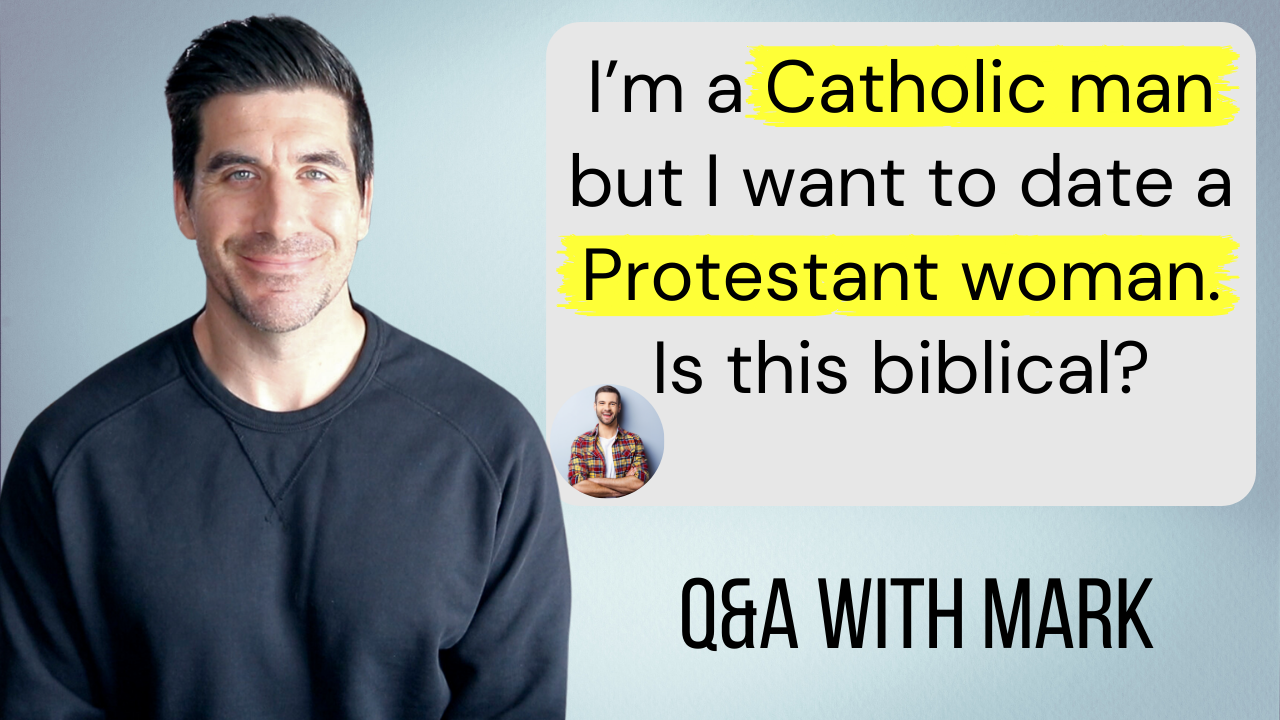
Today we’re going to be answering a question from an AGW subscriber. He wrote in and asked:
Hey Mark,
Hope you are doing well. I have a question for you. I’m a Catholic Christian and there is a girl I really like, but she’s of a different Christian confession (evangelical). Now the Bible talks about choosing an equally yoked partner. She’s a 100% biblical woman, but since there are some differences in the faith (like the sacraments) I’m not sure if such a relationship would be considered equally yoked.
What do you think about this? Do you think people of different Christian confessions are still equally yoked enough so that they can marry? Or do you think you should only date and marry people who have the same confession?
Thank you in advance for taking the time to answer my question!
Take care and God bless!
Andreas
Decide What Theological Differences You Are Willing to Accept in a Spouse
I like how Andreas is thinking when it comes to the dating and marriage. As Christians, there’s really no point to date someone if you already know you could not marry them. I’m not saying you need to know you would or could marry someone before dating. Rather, I’m saying you should not date someone when you already know you won’t ever marry them. Dating should be used to gauge whether or not you should marry someone. This is why there’s no point to date someone you wouldn’t marry.
Thus, when it comes to Catholics and Protestants dating, we should begin by asking if they should get married, which is what Andreas is asking. To answer this question, it can help to define what level of theological differences there are between Protestants and Catholics.
There are essentially three levels, or tiers, when it comes to theological differences:
- A tier 1 issue is one that relates to salvation. If you are wrong about a tier 1 issue, it means you are not saved.
- A tier 2 issue is one that is very important. It will affect what church you can attend, how you relate to God daily, and other major parts of your life.
- A tier 3 issue is important because the word of God will discuss this topic; but it’s not an issue that will divide people so greatly that they can’t continue to work together and attend the same church.
When it comes to choosing a spouse, my advice is that you never marry someone who you have a tier 1 issue with. It would be unbiblical to marry someone you are not equally yoked with from a salvation standpoint (2 Corinthians 6:14).
I would highly recommend you don’t marry someone you have a tier 2 issue with, though you could possibly make it work in rare instances. I wouldn’t say it would be unbiblical to marry someone if you two disagreed on a tier 2 issue because you both are true Christians even though you disagree on this level. However, this level of theological disagreement would make it extremely difficult to grow together in your faith and raise children.
You will have tier 3 disagreements no matter who you marry. No one sees everything the same as someone else.
So where do Catholics and Protestants fall into when it comes to their level of theological differences? That is a hard question to answer because there are variations of theological perspectives in both camps. But generally speaking, the level of differences between Catholics and Protestants is sometimes tier 1 and always at least tier 2.
My concern with the Catholic religion is that they have added so much man-made tradition that they cover the true gospel so much that it’s hard for people to see it all (Matthew 15:9). I think there really are Christians who are practicing Catholic because I think some of them realize you are only saved by grace alone through faith alone (Ephesians 2:8-10). These Catholics would say they are expressing their faith and receiving God’s grace through practicing their Catholic faith.
The danger with that thinking, however, is that it does get dangerously close to a works-based salvation. In most cases, when it comes to Catholics, they cross the line into a works-based salvation and they don’t understand how to truly be saved through Jesus alone. They think their obedience to the Catholic religion is what saves them, which is unbiblical.
However, for the sake of argument, let’s say Andreas is a Catholic man who truly is saved because he’s trusting in Jesus alone for salvation. Should he date this Protestant woman who is also trusting in Jesus alone for salvation? I would still say he should not date her.
The level of differences between Catholics and Protestants is immense. A practicing Catholic and a practicing Protestant would not be able to be members in each other’s churches. How could then they raise a family in the Lord?
So in closing, here are two pieces of advice I would give Andreas or anyone else in this type of situation.
One, prioritize your faith in Jesus above all other relationships. If there is any doubt that a man or woman would hinder your walk with the Lord because of your theological differences, don’t date them.
Second, try to think about the distant future. When your young and you’re thinking about dating, it might seem possible to be with someone who has major theological differences with you. But you have to remember that you are not looking for a boyfriend or girlfriend. You are looking for a spouse to spend the rest of your life with. Living with someone for decades is difficult. It becomes immensely more so when you have core differences about your beliefs in God.
The most successful marriages are the ones that are most unified in Christ.
So, in case you missed it, I would say Catholics and Protestants should not date each other.
